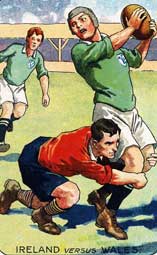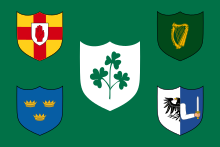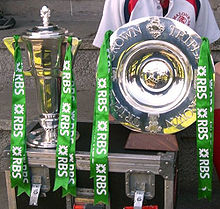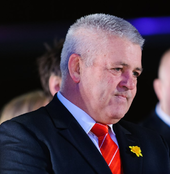Irish national rugby union team

|
|||
| Nickname (s) | Men in Green | ||
| Association | Irish Rugby Football Union | ||
| Trainer |
|
||
| captain | Jonathan Sexton | ||
| WR abbreviation | IRISHMAN | ||
| WR rank | 5. (84.62 points) (as of February 4, 2020) |
||
|
|
|||
|
Most international matches Brian O'Driscoll (133) |
|||
|
Most Points Scored Ronan O'Gara (1083) |
|||
|
Most attempts scored Brian O'Driscoll (46) |
|||
|
First international match England 7-0 Ireland (February 15, 1875) |
|||
|
Biggest win United States 3:83 Ireland (June 10, 2000) |
|||
|
Biggest defeat New Zealand 60-0 Ireland (23 June 2012) |
|||
|
World Cup participations: 9/9 Best result: Quarter-finals 1987, 1991, 1995, 2003, 2011, 2015 and 2019 |
|||
The Irish rugby union team ( English Ireland national rugby union team , irish foireann rugbaí náisiúnta na hÉireann ) is the official Irish national team in rugby union and represents both the Republic of Ireland and Northern Ireland in all international matches ( " test matches ") Men . The Irish Rugby Football Union (IRFU) is responsible for the organization . Ireland is currently (June 2020) 4th on the world rugby rankings . The team takes part in the annual Six Nations , along with England , France , Italy , Scotland and Wales . Ireland is also one of the countries whose players are eligible to play for the British and Irish Lions - players who play for Ireland can therefore also play for the Lions.
The team has its most important international appearances at the world championships that take place every four years . Since the introduction of the Rugby Union World Cup in 1987, Ireland has played in all nine tournaments, losing in the quarter-finals except for the 1999 and 2007 tournaments . In 1999 and 2007 they failed to make it to the quarter-finals, which is Ireland's worst performance at the tournament.
Ireland's first Test Match took place in 1875 when England defeated them. Since the start of the previous five and six Nations tournament, the Home Nations Championship, in 1883, Ireland has won the tournament 14 times and shared the title nine more times. Since Italy joined the tournament in 2000 that became the Six Nations, Ireland has won four titles, most recently in 2018.
The Irish national rugby union team is unique in the rugby world in that it is an all-Ireland national team and represents the entire island of Ireland, not just one country or nation. Players from both the Republic of Ireland and Northern Ireland, one of the four countries in the United Kingdom , are allowed to play for the Irish rugby team. For this reason the Irish rugby team does not use either of the national anthems or flags as a symbol; instead, the Irish national team uses its own flag - that of the Irish Rugby Football Union - and anthem. Alternatively, the team enters the field with both the flag of Ireland and the flag of the Province of Ulster , which includes the six Irish counties of Northern Ireland. Due to the joint team for the Republic of Ireland and Northern Ireland, the Irish rugby team is regarded as an important symbol of peace and cooperation on the politically divided island of Ireland , alongside the similarly structured Irish national hockey team for men and women and the Irish national cricket team . Twelve former Irish rugby players have been inducted into the World Rugby Hall of Fame .
organization
The Irish Rugby Football Union (IRFU) is responsible for the organization of rugby union in Ireland . The IRFU was created in 1879 through the merger of the Irish Football Union and the Northern Football Union of Ireland . The IRFU founded the International Rugby Board (IRB), today World Rugby, together with the Scottish Rugby Union (SRU) and the Welsh Rugby Union (WRU) in 1886 . The IRFU consists of the four provincial associations Connacht Rugby , Leinster Rugby , Munster Rugby and Ulster Rugby , each with their own teams participating in Pro14 . This includes the All-Ireland League , in which 50 rugby clubs from all over Ireland take part.
In addition to the actual national team, the IRFU brings together other selection teams. The U-20 national team takes part in the relevant world championships. Children and young people are introduced to the sport of rugby at school and, depending on their interests and talent, the training then begins. Ireland's second national team is Ireland Wolfhounds , followed by Emerging Ireland, and for schoolchildren there is the schoolboys national team , who are all preliminary stages to the national team.
The international championship European Rugby Champions Cup , which is held together with teams from France, Ireland, Italy, Scotland and Wales, is superordinate to the national championship . Since the seasons overlap only a little, numerous players are used in all three leagues.
The greatest honor for Irish players is to go on tour with the British and Irish Lions in the southern hemisphere, where every couple of years they face either the " All Blacks " from New Zealand , the " Springboks " from South Africa or the " Wallabies " from Australia .
history
The first decades
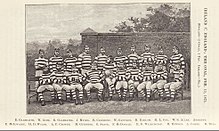
Long before the emergence of rugby, sports were practiced in Ireland that are very similar to rugby. B. Caid . Caid was played within a demarcated area and with a fixed number of players; however, rugby does not appear to have evolved out of Caid.
RH Scott, a former rugby school student , formed a club at Trinity College , Dublin , in 1854 . That same year, Reece Lockhart founded a club in his hometown of Cork . Until 1867, the second team of Trinity College carried out regular games against two other school teams from Leinster (St. Columbia's College and Hume High Street) and against the Royal School in Dungannon . The games against the Royal School helped establish the young sport in the north of the island. After official rules were established in 1868, the sport spread across the island, leading to the creation of more clubs in Ireland, most of which still exist today, including the NIFC (1868); Wanderers (1869); Queen's University (1869); Lansdowne (1873); Dungannon (1873); Co. Carlow (1873); UCC (1874); and Ballinasloe (1875), who merged with Athlone to form Buccaneers.
In 1874 the Irish Football Union was founded, which was renamed the Irish Rugby Football Union (IRFU) after merging with the North of Ireland Union . Ireland played their first international match on February 15, 1875 in the London Oval and lost 7-0 to England. As was customary at the time, both teams consisted of 20 players, as the number of players per team was only reduced from 20 to 15 during a game in 1877. The first home game took place in the same year against England and was played at the Leinster Cricket Club in Rathmines after Lansdowne Road , the actual home ground of the IRFU, was found to be unsuitable. The first game there took place on March 11, 1878 again against England, which ended with two goals and one attempt to zero in favor of the guests from England. Also in 1877 Ireland played against Scotland for the first time, but lost with 0 goals to 6.
The Irish won their first test match victory against Scotland in Belfast in 1881 . In 1882, Scotland, England, Wales and Ireland founded the Home Nations Championship, the forerunner of today's Six Nations. In 1884 the Irish were missing two players in the game against Wales in Cardiff , so they had to borrow two Welsh players. The Irish won their first victory on Lansdowne Road on February 5, 1887, when they beat England for the first time. The final score was two goals to zero. A good year later followed on March 3, 1888, the first win against Wales with a goal, a try and a drop goal to zero.
In the 1890s, rugby in Ireland was mainly played by the Protestant middle class, the victorious national team of 1894, for example. B. only a single Catholic (Tom Crean). The geographic expansion of the sport was also limited: of the 18 players who played in the three games during the Home Nations Championship in 1894 , thirteen were provided by three clubs from Dublin (Wanderers, Dublin University and Bective Rangers), while the remaining five came from Ulster in the north of the island.
In the Home Nations Championship in 1894 Ireland used seven instead of six back team players for the first time , following the Welsh style of play. The change in line-up turned out to be successful: The Irish team won the Triple Crown for the first time this year by winning over England, Scotland and Wales and thus won the tournament. The Irish won the tournament two more times before the end of the century ( 1896 and 1899 ), so that at the turn of the century all four Home Unions were able to show their first successes in a sport that was enjoying growing popularity with players and spectators.
1900 to 1950s
There was great interest in the “ All Blacks ” first visit to Dublin in November 1905 and the IRFU managed to organize the first sold-out rugby game in history. Ireland copied the New Zealanders' style of play and played the game with just seven strikers. However, the Irish lost with 0:15, their first victory came in the 28th meeting 111 years later. In 1906 the title was shared with Wales. The first game against France was played on March 20, 1909 and ended with a 19-8 victory for the Irish; this was the highest win in an international match to date. In 1912 the title was shared with England. Another premiere was on November 30, 1912 with the first game on Lansdowne Road against the South African " Springboks ", which was lost 0:38 (to date, the highest defeat against South Africa, which could achieve ten attempts); the 1906 game against South Africa took place at Ravenhill Grounds . In 1920 and 1921 Ireland was only able to "win" the " Wooden spoon ", after finishing last in the table in both tournaments. In 1926 the Irish had the chance to create the Grand Slam for the first time in the Five Nations tournament , ie to end the tournament with victories against all other teams; however, they lost their last game against Wales in Cardiff. In 1927 the Irish were again close to the Grand Slam when they received their only defeat against England 6-8. In 1927 Ireland also played against the Wallabies for the first time, but lost at home just 3: 5. In 1935 the Irish achieved their first undivided tournament victory in 36 years.
The sport of rugby in Ireland celebrated its greatest success in 1948 , when the national team made the Grand Slam for the first time. The Irish beat France and England away, winning home games against Scotland in Dublin and Wales in Belfast. Further Five Nations tournament victories followed in 1949 and 1951 , with the last-mentioned tournament narrowly missing another Grand Slam with a 3-3 draw in the last game against Wales. In 1952 Ireland made its second overseas tour - and the first in 50 years - when it set off for Argentina for nine games, including two test matches; Ireland won a Test and drew one game.
On February 27, 1954, the game against Scotland was to be played at Ravenhill Stadium in Belfast. The new Irish captain informed the President of the IRFU that the eleven players from the Republic of Ireland would not stand next to the Scots while " God Save the Queen " was playing . It was agreed that a shortened version of the anthem - known as the Salute - would be played and that no international matches would be played in Belfast in the future. Ireland beat Scotland 6-0. The next international match in Northern Ireland did not take place again until August 2007. In 1958 Ireland beat Australia 9: 6 in Dublin, defeating one of the “big” touring rugby nations for the first time. During the Five Nations 1959 Ireland denied France the Grand Slam in the last game when they could defeat the newly crowned title holder 9-5. During the Five Nations 1960 Ireland allowed four attempts by the French at Cardiff Arms Park and they only put one down themselves, losing with a record 6:23. Frenchman Pierre Albaladejo set a new record for most drop goals during the game when he scored three of them.
1960s to 1990s
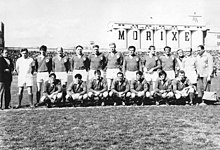
In the early 1960s Ireland won only three Five Nations wins: 1961 against England, 1963 against Wales and 1964 again against England. In 1965 Ireland improved its performance when they defeated England and Scotland.
On April 10, 1965, the Irish won against South Africa for the first time. In January 1967, Ireland again defeated Australia in Dublin. In May 1967 they became the first of the "Home Nations" to win an away win in the southern hemisphere when they beat the Australians in Sydney . The planned encounter against the All Blacks during their European tour in 1967 had to be canceled due to an outbreak of foot and mouth disease . On October 26, 1968, Ireland achieved their fourth victory in a row over the Wallabies. In 1969 the Irish had another chance to end the Five Nations tournament with a Grand Slam, but the last game against Wales was lost. Before that they defeated France 17: 9, their first victory over Les Bleus in eleven years. In the fall of the same year, the IRFU decided to hire a national coach for the national team: Ronnie Dawson. In 1970 the Irish drew against the Springboks when they scored 6-6 on Lansdowne Road.
The Five Nations tournament of 1972 had to end prematurely because of the Northern Ireland conflict, so there was no winner. After Bloody Sunday in Derry , the British embassy in Dublin was burned down by an angry mob and numerous players had received threatening letters, presumably from the IRA. Scotland and Wales refused to play for the upcoming away games in Ireland and justified this with the lack of security. During the 1973 Five Nations , the English team traveled to Dublin despite similar threats and received a standing ovation for five minutes after arriving on Lansdowne Road. Ireland won the game 18-9. The English team captain John Pullin said: "We may not be very good, but at least we have been there." ( We might not be very good but at least we turned up ) The Five Nations 1973 ended tied between all five participating teams, a one-time result. Ireland came close to defeating the All Blacks for the first time on January 20, 1973, but the game ended in a 10-10 draw. In 1974 Ireland won its first Five Nations tournament since 1951. In 1976 they lost to the Wallabies at 10:20 at home on Lansdowne Road. In 1979 Ireland won a test series against the Wallabies in Australia 2-0.
Willie John McBride was Ireland's national coach until 1984. In 1982 Ireland was able to achieve the Five Nations and the first Triple Crown after 33 years under its team captain and half- liaison Ollie Campbell. In 1983 the title was shared with France; the victorious teams each won three games and lost one each. In 1984 they lost to the Wallabies on their tour to Great Britain and Ireland, who were able to achieve the Grand Slam for the first time after they also defeated England, Wales and Scotland. During the Five Nations 1985 Ireland succeeded again in the Five Nations tournament victory with the Triple Crown. However, by 2004 this would be Ireland's last Triple Crown. Ireland was on the verge of making the Grand Grand Slam both times, but was defeated by the French. The 1986 Five Nations tournament ended without a single win, but on November 1st of the same year the Irish wrote rugby history: They won 60-0 against Romania after ten attempts; They achieved the world's highest victory to date for a national team and equalized the record set by the French in 1967.
At the 1987 World Cup , the first ever, Ireland won the group matches against Tonga and Canada , but lost in the quarter-finals to hosts Australia at 15:35. In 1988 Ireland played against Italy for the first time and won with 31:15. In the 1990s, Ireland never came second to last in the Five Nations tournament. In 1991 they even lost a series of tests against Namibia .
The 1991 World Cup took place in the then Five Nations, and thus also in Ireland. The Irish initially won easily against Japan and Zimbabwe , but narrowly lost their third group game against Scotland. In the quarter-finals on Lansdowne Road they were in the lead against Australia for a long time and were close to the surprise victory, but after Michael Lynagh was able to make the decisive attempt, the Irish finally had to admit defeat 18:19.
During the Five Nations in 1994 , Ireland defeated England in Twickenham.
At the 1995 World Cup in South Africa , Ireland lost its first game against New Zealand and then clearly won against Japan. An extremely narrow 24:23 victory over Wales secured the third quarter-final qualification in a row. In the quarter-finals, however, the French proved to be superior.
Professional era
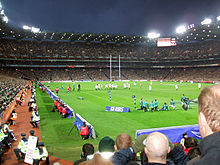
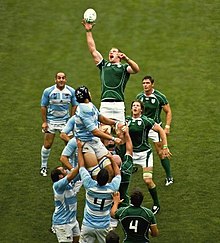



On August 26, 1995, the International Rugby Board lifted all restrictions on player payment, ushering in the professional era of rugby union. However, the beginning of the professional era was disappointing for the Irish. After the Irish had finished the Five Nations tournaments in 1996 , 1997 and 1998 in last place, they also lost three games against Italy: 1995 away (12:22) and 1997 both at home (29:37) and away ( 22:37). In 1998, Warren Gatland was hired as national coach, but there was no immediate success after the 1999 World Cup - in which Ireland played its group games at home - for the first time missed qualification for the quarter-finals. They finished group E with Australia, the USA and Romania in second place, but all runners-up had to play an elimination game for a place in the quarter-finals; Ireland lost against Argentina by 24:28 .
From that low point, however, Irish rugby has seen an upward trend. In the course of the professionalization of rugby union at the end of the 1990s, the Irish Rugby Football Union upgraded the selection teams of the four provincial associations to professional teams. The four teams turned out to be financially strong enough to keep the best players in their own country. They continued to maintain close relationships with amateur clubs and schools, which guaranteed a constant supply of talented young players. The introduction of the Celtic League led to more games at a high level and to a noticeable improvement in the quality of the game.
The establishment of the new Six Nation tournament after Italy joined in 2000 coincided with the revival of Irish rugby. During the Six Nations 2001 Ireland finished in second place. Eddie O'Sullivan became the new national coach in November 2001 after Warren Gatland was fired. During the end-of-year Rugby Union Internationals in 2002 , Ireland won all three Test matches after beating the Wallabies (18: 9), Fiji (64:17) and Argentina (16: 7).
During the Six Nations 2003 Ireland lost the decisive home game for the Grand Slam against England in Lansdowne Road, ending the streak of ten consecutive home wins since September 2002. At the 2003 World Cup in Australia, Ireland played in Group A against Australia, Argentina, Romania and Namibia and qualified for the quarter-finals as runners-up. However, this was then lost to France at 21:43. At the Six Nations tournament in 2004 , the Irish were the first to defeat the English after they had won the world championship title, thereby securing a Triple Crown again after 19 years and finishing the tournament in second place. In the 2004 End-of-Year Rugby Union Internationals , Ireland defeated South Africa, the USA and Argentina one after the other. During the Six Nations 2005 Ireland ranked third. More Triple Crowns followed in 2006 and 2007 , but France prevented the tournament from winning both times. During the 2007 tournament, Ireland scored a historic win over England at Croke Park when they won 43-13, their biggest win over England.
During the 2006 end-of-year Rugby Union Internationals , Ireland beat South Africa, Australia and the Pacific Islanders in a row at home . Before the 2007 World Cup , the Irish were one of the favorites, but then disappointed across the board. After two extremely narrow victories against the supposed outsiders Namibia and Georgia, defeats against France and Argentina followed. Thus, the team was eliminated for the first time after the preliminary round.
After Lansdowne Road was demolished , Ireland needed a new home stadium. Croke Park , headquarters of the Gaelic Athletic Association , hosted the Irish team between 2007 and 2010. Ireland suffered three defeats during the 2008 Six Nations . Eddie O'Sullivan resigned as coach of Ireland and was replaced by Declan Kidney .
At the Six Nations 2009 Ireland not only won the tournament, but also the Triple Crown and only for the second time (after 1948) the Grand Slam. Both Grand Slam and Triple Crown could only be secured by a drop goal from Ronan O'Gara in the 77th minute in a narrow 17:15 win in the last game against Wales.
After a draw with Australia and victories over Fiji and South Africa during the end-of-year Rugby Union Internationals in 2009 , Ireland finished the year undefeated.
In their last game of the Six Nations 2010 , and the last one at Croke Park, Ireland was defeated by Scotland after a penalty by Dan Parks in the last minute with 20:23 and thus robbed the Triple Crown. Ireland started the end-of-year Rugby Union Internationals 2010 with a 21:23 loss to South Africa, the first test match at the new Aviva Stadium in Dublin . This was followed by a 20:10 win against Samoa, an 18:18 defeat against New Zealand and a 29-9 win against Argentina.
During the Six Nations 2011 , Ireland was defeated by France in the first Six Nations game at the Aviva Stadium with 22:15. During the 13:19 loss to Wales, Ronan O'Gara became the first Irish and fifth overall rugby player to score 1,000 points. During Ireland's 24-8 victory over England, Brian O'Driscoll made his 25th attempt and set a new record for most attempts in a Six Nation tournament. After four wins in four group matches, Ireland qualified for the quarter-finals during the 2011 Rugby Union World Cup , but lost to Wales.
During the Six Nations 2012 Ireland finished in third place. During Ireland's tour to New Zealand at the 2012 Mid-year Internationals , they suffered a 19-22 defeat, followed by a 0:60, Ireland's biggest loss ever. During the end-of-year Rugby Union Internationals in 2012, Ireland was defeated by South Africa, but was able to win against Fiji and Argentina.
During the 2013 Six Nations , Ireland scored one win but lost three games and drew once, including their first home defeat to England in ten years; and the first ever loss to Italy in the Six Nations when they lost in front of 75,000 spectators at the Stadio Olimpico in Rome. The IRFU declined to renew the contract with Declan Kidney and hired Joe Schmidt as the new national coach. During the end-of-year Rugby Union Internationals 2013 , Ireland was beaten by New Zealand 24:22 after being in the lead for almost the entire game.
Ireland started the Six Nations in 2014 with victories over Scotland and Wales. This was followed, however, by a 10-13 defeat against England. Ireland won the following game against Italy 46-7. Ireland then defeated France with 22:20 and thus secured the Six Nations title. During the end-of-year Rugby Union Internationals 2014 in Dublin, the Irish won over South Africa (29:15), Georgia (49: 7) and Australia (26:23).
Ireland managed to defend their title during the Six Nations 2015 and won the tournament for the second time in a row due to the better point difference. After victories over Wales and Scotland during the warm-up games before the Rugby Union World Cup in 2015 , Ireland briefly reached second place in the world rankings, until then Ireland's best position; after which Ireland was even traded as a favorite for the title. Ireland succeeded in winning the group after a 24: 9 victory over France, but surprisingly failed in the quarter-finals to Argentina and lost 20:43.
Ireland started the Six Nations 2016 with a team weakened by injured players and could only win two games during the tournament (58:15 against Italy and 35:25 against Scotland); in the game against Wales only a 16:16 draw. During the Mid-year Internationals 2016 , the Irish won their first of three test matches in South Africa with 26:20, but lost the other two with 26:32 and 13:19. During the end-of-year Rugby Union Internationals 2016 , Ireland achieved their first victory over the All Blacks in 111 years on November 5, when they defeated New Zealand 40:29 at Soldier Field in Chicago . This was New Zealand's only defeat of the year and also ended their winning streak in 18 consecutive test matches. Despite the 9:21 loss to New Zealand in the second leg in Dublin, Ireland reached fourth place in the world rankings.
Ierland finished the 2017 Six Nations in second place behind defending champions England after defeating England 13: 9 in the last game, ending their record series of 18 consecutive victories since 2015. The Irish were defeated in the same tournament by Scotland 27-22 and Wales 22-9. After many of Ireland's best players left for New Zealand with the British and Irish Lions, Ireland played its Mid-year Internationals in 2017 with a development team; they achieved a 55:19 victory over the United States and a 2-2 series victory over Japan. After a record victory over South Africa (38: 3). and victories over Fiji and Argentina during the End-of-Year Internationals 2017 , Ireland climbed to third place in the world rankings.
After winning the Six Nations in 2018 with a Grand Slam, Ireland returned to second place in the world rankings. A 2-1 straight win over Australia during the Mid-year Internationals 2018 , followed by a second win in two years over the world number one from New Zealand 16: 9, secured Ireland's second place in the world rankings.
Defending champions Ireland suffered a shocking performance slump during the 2019 Six Nations . The tournament started with a clear 20:32 loss to England. The end result did not really reflect the Irish performance, as one could not build on the performance of previous years. The defeat was followed by victories over Scotland, Italy and France; However, the tournament ended with a disappointing defeat against the Grand Slam winners from Wales and they lost 7:25. The Welsh were leading 25-0 until the end, when substitute connection half Jordan Larmour tried in the last minute and scored points for the Irish in an otherwise disastrous game. Ireland entered the 2019 Rugby Union World Cup as the world's number one, ending up in second place in the group stage after a shocking defeat against hosts Japan (19:12), which meant they met defending champions All Blacks in the quarter-finals. New Zealand defeated the Irish 46:14, which was the seventh time Ireland were eliminated in the quarter-finals.
Flag and anthem
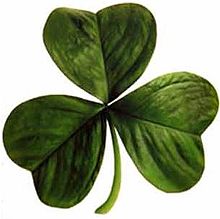
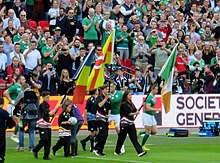
Ireland traditionally plays in a green shirt with white shorts and green socks. The logo includes a shamrock and a rugby ball; a shamrock was depicted on the emblem at the first game of an Irish team in 1874.
From 1996 to the summer of 2002 Irish Permanent was the main sponsor of Ireland, which after a merger under the name Permanent TSB and sponsored the national team until autumn 2006. O 2 has been Ireland's shirt sponsor since 2014 . Three Ireland was the main sponsor of the Irish until summer 2016 and was replaced by Vodafone .
Umbro was Ireland's kit supplier until 1992 . Between 1992 and the summer of 2000, the Irish jersey was made by Nike . Canterbury took over in the summer of 2000 and outfitted the Irish until 2009. In November 2009 Puma took over the equipment for the Irish. In January 2014, the IRFU signed a contract with Canterbury, which made the jersey between November 2014 and 2020.
The Irish national rugby union team is one of the few national teams on the island to have the support of both Irish nationalists and unionists with the UK . Since the team is made up of players from two independent countries, there has been controversy in the past about which flags and anthems should be used. When the Irish internationals were held alternately in Belfast and Dublin, the British national anthem " God Save the Queen " rang out at the Belfast games and the Irish national anthem " Amhrán na bhFiann " at the Dublin games . No anthem was played in away games. During the Rugby Union World Cup in 1987, "The Rose of Tralee" was the anthem of Ireland.
Since 1995, " Ireland's Call " has been played at away games, an anthem composed especially for this purpose. This led to protests from some players and fans from the Republic of Ireland who demanded that "Amhrán na bhFiann" should be played. Later on, "Ireland's Call" was always played together with "Amhrán na bhFiann" at encounters in Dublin. This in turn led to similar protests by players and fans from Northern Ireland during the preparation game in 2006 for the 2007 World Cup against Italy (the first Irish game in Belfast since 1953). They demanded that "God Save the Queen" should be played in Belfast in addition to "Ireland's Call", but the IRFU refused. This was justified by the fact that "Ireland's Call" and "Amhrán na bhFiann" are only played together in Dublin, while outside the Republic of Ireland only "Ireland's Call" is used.
The flag of Ireland is only hoisted at games in Dublin, and this only together with a flag, which symbolizes the four historical provinces of Ireland ( Connacht , Leinster , Munster and Ulster ). Only the association flag is hoisted at away games. The typical Irish shamrock symbol, a three-leaf clover , is often used . During the 2011 Rugby Union World Cup, 2015 Rugby Union World Cup and 2019 Rugby Union World Cup, the Irish team entered the rugby field with both the flag of Ireland and the flag of the province of Ulsters, which includes the six Northern Irish counties.
Stages
The traditional home of Irish rugby was Lansdowne Road in Dublin, where Ireland played most of its home games. The stadium was demolished in 2007 and the new stadium was completed in 2010. The naming rights were sold to an insurance company and the stadium has been called Aviva Stadium ever since.
The original stadium, owned by the IRFU, was built in 1872 and became the first pure rugby stadium to host test matches. In 1878 the first test match was played there when Ireland received England (the first rugby match at the stadium was between Ulster and Leinster ). Lansdowne Road had a capacity of just over 49,000 before it was demolished in the summer of 2007. The new stadium has a capacity of 51,700 and was opened in May 2010. The last Irish test match before construction began was played against the Pacific Islanders in late 2006 .
After Lansdowne Road was not available for rugby games during construction, Ireland was in the following Six Nations without a home stadium. Then the Gaelic Athletic Association (GAA) provided Croke Park (with a capacity of 82,500 spectators) for the Irish home games against France and England 2007 available. These were the first rugby matches to be played in the stadium. Croke Park also hosted Ireland's other home games during the Six Nations and other test matches up to the completion of the new Lansdowne Road stadium.
The first test match Ireland in the newly built stadium took place on November 6, 2010 against the then world champions of South Africa. The Springboks won the game 23:22. Due to the historical importance of the game, South Africa offered to play in the away jersey, so Ireland could play the game in the home jersey; Usually the home team plays a game in the away shirt when the shirt colors of both teams match.
Venues during rugby union world championships
Although Ireland has not yet acted as the sole host of a World Cup, matches were played in Ireland during the 1991 and 1999 World Cups. Group B of the 1991 World Cup was mainly played in Ireland and Scotland, including two games in Lansdowne Road (Ireland's home games) and one (Zimbabwe versus Japan) at Ravenhill Stadium , Belfast. A quarter-final and a semi-final were also played in Dublin. A similar tournament format was used during the 1999 World Cup, with Lansdowne and Ravenhill also playing games at Thomond Park . Lansdowne Road also hosted a quarter-finals in 1999. Ireland was to host matches during the 2007 Rugby Union World Cup in Lansdowne Road, but due to scheduling conflicts over construction work on Lansdowne Road, the host rights were waived.
Test matches

Ireland has so far (as of July 2020) won 319 of its 702 test matches , which corresponds to a win rate of 45.44%.
| country | Games | Won | undecided eliminated |
Lost | % Victories |
|---|---|---|---|---|---|
|
|
18th | 12 | 0 | 6th | 66.67 |
|
|
36 | 13 | 1 | 22nd | 36.11 |
|
|
136 | 49 | 8th | 79 | 36.03 |
|
|
4th | 4th | 0 | 0 | 100 |
|
|
98 | 35 | 7th | 56 | 35.71 |
|
|
4th | 4th | 0 | 0 | 100 |
|
|
31 | 27 | 0 | 4th | 87.10 |
|
|
8th | 7th | 0 | 1 | 87.50 |
|
|
8th | 7th | 1 | 0 | 87.50 |
|
|
4th | 2 | 0 | 2 | 50.00 |
|
|
32 | 2 | 1 | 29 | 6.25 |
|
|
1 | 1 | 0 | 0 | 100 |
|
|
8th | 8th | 0 | 0 | 100 |
|
|
3 | 3 | 0 | 0 | 100 |
|
|
7th | 6th | 0 | 1 | 85.71 |
|
|
136 | 65 | 6th | 65 | 47.79 |
|
|
26th | 7th | 1 | 18th | 26.92 |
|
|
2 | 2 | 0 | 0 | 100 |
|
|
130 | 55 | 7th | 68 | 42.31 |
|
|
1 | 1 | 0 | 0 | 100 |
|
|
9 | 9 | 0 | 0 | 100 |
| Total | 702 | 319 | 32 | 351 | 45.44 |
successes
World championships
Ireland has participated in every World Cup so far and has reached the quarter-finals seven times, but has lost to Australia (1987 and 1991), France (1995 and 2003), Argentina (1999 and 2015), Wales (2011) and New Zealand (2019). At the 1999 World Cup, Ireland lost the game in the "round of hope" against Argentina and thus missed qualifying for the quarter-finals. At the 2007 World Cup, Ireland did not get beyond the group stage after winning two games and losing two.
- World Cup 1987 : quarter-finals
- 1991 World Cup : quarter-finals
- World Cup 1995 : quarter-finals
- World Championship 1999 : 2nd round
- World Championship 2003 : quarter-finals
- World Championship 2007 : preliminary round (2 wins)
- World Cup 2011 : quarter-finals
- World Championship 2015 : quarter-finals
- World Championship 2019 : quarter-finals
- World Championship 2023 : qualified
Home Nations / Five Nations / Six Nations
Scotland's only annual tournament is the Six Nations, where you play against five other European teams: England, France, Italy, Scotland and Wales. The Six Nations began in 1883 as the Home Nations Championship; France became part of the tournament that became the Five Nations in 1910 and Italy joined the tournament that became the Six Nations in 2000. Ireland won its first title in 1894, along with a Triple Crown. Ireland won its first Grand Slam in 1948 and the second in 2009. Ireland has won the tournament 14 times so far, most recently in 2018; there are also eight shared victories. Ireland won its third Grand Slam during the Six Nations 2018 with a 24:15 win over England in Twickenham on March 17th ( St. Patrick's Day ). Since 1988 Ireland has played the Millennium Trophy against England during the Six Nations and since 1989 the Centenary Quaich against Scotland.
- 14 single victories (1894, 1896, 1899, 1935, 1948, 1949, 1951, 1974, 1982, 1985, 2009, 2014, 2015, 2018)
- 8 shared victories (1906, 1912, 1926, 1927, 1932, 1939, 1973, 1983)
- 3 Grand Slams (1948, 2009, 2018)
- 10 Triple Crowns (1894, 1899, 1948, 1949, 1982, 1985, 2004, 2006, 2007, 2009)
More test matches
During the amateur era, Ireland toured abroad, sometimes for months, to compete against other national teams as well as against regional selections and club teams. They also received touring national teams in Ireland.
The tours according to old tradition came to a standstill around the year 2000. Today there are two time slots available every year for test matches against teams from the southern hemisphere. At the Mid-year Internationals in June Ireland travels to the southern hemisphere, at the End-of-year Internationals in November, teams from the southern hemisphere are welcomed to Ireland. Ireland has played against Australia for the Lansdowne Cup since 1999 and since 2012 against Argentina for the Admiral Brown Cup .
player
Current squad
The following players make up the roster during the Six Nations 2020 :
Famous players
Twelve Irish players were inducted into the World Rugby Hall of Fame for their outstanding performance . These are Ronnie Dawson , Mike Gibson , Tom Kiernan , Jack Kyle , Basil Maclear , Willie John McBride , Syd Millar , Brian O'Driscoll , Ronan O'Gara , Tony O'Reilly , Fergus Slattery and Keith Wood .
Player statistics
(As of July 2020)
|
|
|
|
Trainer
Ireland first appointed a national coach in 1968: Ronnie Dawson. Andy Farrell is currently the Irish national coach, having been hired in 2019.
- Ronnie Dawson: 1969-1972
- Syd Millar: 1972-1975
- Roly Meates: 1975-1977
- Noel Murphy: 1977-1980
- Tom Kiernan: 1980-1983
- Willie John McBride: 1983-1984
- Mick Doyle: 1984-1987
- Jim Davidson: 1987-1990
- Ciaran Fitzgerald: 1990-1992
- Gerry Murphy: 1993-1995
- Murray Kidd: 1995-1997
- Brian Ashton: 1997-1998
- Warren Gatland: 1998-2001
- Eddie O'Sullivan: 2001-2008
- Michael Bradley: 2008 (interim trainer)
- Declan Kidney: 2008-2013
- Les Kiss: 2013 (interim trainer)
- Joe Schmidt: 2013–2019
- Andy Farrell: since 2019
literature
- Tom English: No Borders: Playing Rugby for Ireland . Ed .: Arena Sport. Dublin 2018, ISBN 978-1-909715-18-9 .
- Edmund van Esbeck: Irish Rugby 1874-1999: A History . Ed .: Gill & Macmillan. Dublin 1999, ISBN 0-7171-2930-6 , pp. 327-385, 399-406 ( irishrugby.ie ).
Web links
- Irish Rugby Football Union
- fan page
- Rugby News ( January 23, 2007 memento on the Internet Archive )
- Ireland match statistics on rugbydata.com
Individual evidence
- ^ World Rugby Rankings. world.rugby, February 4, 2020, accessed November 26, 2019 .
- ↑ Most matches. ESPNscrum, accessed June 24, 2020 .
- ↑ Most points. ESPNscrum, accessed June 24, 2020 .
- ↑ Most tries. ESPNscrum, accessed June 24, 2020 .
- ↑ a b c d e f g World Rugby Rankings. World Rugby , accessed June 24, 2020 .
- ^ History of the Irish Rugby Football Union. In: Irish Rugby Football Union. IRFU.ie, accessed April 9, 2015 .
- ^ Steve Lewis, One Among Equals: England's International Rugby Captains . Ed .: Vertical Editions. 2008, ISBN 978-1-904091-31-8 , pp. 274 .
- ↑ 15th February 1875 - The Oval, London, England. rugbydata.com, accessed February 16, 2007 .
- ^ Ireland> Games Played. rugbydata.com, accessed February 16, 2007 .
- ^ Irish International Teams: Results, Scorers, Dates and Venues - 1874 to June 1999. In: Irish Rugby Football Union. IRFU.ie, accessed October 31, 2008 .
- ↑ 6 Nations History. Rugby Football History, archived from the original on May 16, 2020 ; accessed on May 3, 2020 (English).
- ↑ Editor: Connacht Gear Up For Launch Of New Kits: Irish Rugby | Official website. In: Irish Rugby Football Union. IRFU.ie, October 19, 2011, accessed February 8, 2014 .
- ↑ Autumn internationals: Ireland 40-29 New Zealand. In: BBC Sport. Retrieved November 20, 2018 .
- ^ Six Nations Championship: Past Winners. ESPNscrum, archived from the original on February 20, 2019 ; accessed on May 31, 2020 (English).
- ↑ Frank Keating: How Ravenhill rebels made an issue out of an anthem. The Guardian , February 27, 2007; archived from the original on September 23, 2019 ; accessed on December 14, 2019 (English).
- ↑ 1959: Finding William. nobok.co.uk, accessed April 10, 2007 .
- ↑ CR's Video Vaults: Ireland vs South Africa Rugby 1965. Youtube , June 28, 2011, archived from the original on May 17, 2020 ; accessed on December 14, 2019 (English).
- ↑ a b Beach beckons as All Blacks celebrate history. The New Zealand Herald , November 27, 2005, accessed July 23, 2015 .
- ^ Orders, Mark: When the Wales rugby team faced 'death threats' in Ireland. walesonline, February 19, 2018, archived from the original on July 3, 2018 ; accessed on December 14, 2019 (English).
- ^ The day England won a Lansdowne ovation. In: The Irish Times. March 29, 2003, archived from the original on January 10, 2020 ; accessed on December 14, 2019 (English).
- ↑ Ackford Paul: Breaking the losing streak. The Telegraph, November 12, 2006, archived from the original July 7, 2016 ; accessed on January 19, 2020 (English).
- ^ Rugby World Cup 1987: Matches. rugbyworldcup.com, 2019, accessed July 14, 2020 .
- ^ Rugby World Cup 1991: Matches. rugbyworldcup.com, 2019, accessed July 14, 2020 .
- ^ Rugby World Cup 1995: Matches. rugbyworldcup.com, 2019, accessed July 14, 2020 .
- ↑ RWC Blog: Italy's Golden Era against Ireland. RTÉ News, September 29, 2011, archived from the original on May 17, 2020 ; accessed on April 5, 2020 (English).
- ^ Rugby World Cup 1999: Matches. rugbyworldcup.com, 2019, accessed July 14, 2020 .
- ^ Rugby World Cup 2003: Matches. rugbyworldcup.com, 2019, accessed July 14, 2020 .
- ↑ England suffer record defeat. The Telegraph, February 24, 2007, accessed September 6, 2007 .
- ^ Rugby World Cup 2007: Matches. rugbyworldcup.com, 2019, accessed July 14, 2020 .
- ^ O'Sullivan quits as Ireland coach. BBC , March 19, 2008, archived from the original on June 22, 2019 ; accessed on December 14, 2019 (English).
- ↑ 2009 Six Nations. BBC , March 22, 2009, archived from the original on November 12, 2019 ; accessed on December 14, 2019 (English).
- ^ Wales 15-17 Ireland. RTÉ Sport, March 21, 2009, archived from the original on March 22, 2009 ; Retrieved March 23, 2009 .
- ↑ Ten out of ten: Ireland's unbeaten 2009 in rugby. The Irish Times, December 3, 2009, archived from the original on June 24, 2018 ; accessed on December 14, 2019 (English).
- ↑ Ireland 20-23 Scotland. BBC , March 20, 2010; archived from the original on December 8, 2019 ; accessed on December 14, 2019 (English).
- ↑ SA to play in Aviva rugby opener. British Broadcasting Corporation , October 8, 2009, accessed June 19, 2020 .
- ^ O'Driscoll sets all-time try record. The Sydney Morning Herald, March 19, 2011, archived from the original on February 4, 2020 ; accessed on December 14, 2019 (English).
- ^ Rugby World Cup 2011: Matches. rugbyworldcup.com, 2019, accessed July 14, 2020 .
- ↑ 2012 Six Nations: England 30-9 Ireland. BBC , March 17, 2012, archived from the original on April 17, 2019 ; accessed on December 14, 2019 (English).
- ↑ Ireland End Tour With Heavy Loss. In: Irish Rugby Football Union . IRFU.ie, June 23, 2012, archived from the original on June 28, 2012 ; Retrieved June 23, 2012 .
- ↑ Penalties Decide It As Ireland Lose Brutal Contest. In: Irish Rugby Football Union . IRFU.ie, February 10, 2013, archived from the original on February 12, 2013 ; Retrieved February 10, 2013 .
- ↑ Italy claim historic RBS 6 Nations win over Ireland. In: rbs6nations.com. Sportsbeat, March 16, 2013, archived from the original on October 24, 2013 ; accessed on March 16, 2013 .
- ^ Rugby Union - ESPN Scrum - Italy v Ireland at Rome. ESPNscrum, archived from the original on November 16, 2019 ; accessed on April 5, 2020 (English).
- ^ Six Nations 2013: Italy 22–15 Ireland. BBC , March 16, 2013, archived from the original on December 24, 2018 ; accessed on December 14, 2019 (English).
- ↑ IRFU Announce Joe Schmidt As Ireland Coach. In: Irish Rugby Football Union . IRFU.ie, April 29, 2013, archived from the original on May 1, 2013 ; Retrieved April 29, 2013 .
- ↑ Last Minute Try Denies Ireland Historic Win. In: Irish Rugby Football Union . IRFU.ie, November 24, 2013, archived from the original on November 27, 2013 ; Retrieved November 25, 2013 .
- ^ New Zealand deny Ireland to win 24-22 and seal perfect year. BBC Sport, November 24, 2013, accessed July 23, 2015 .
- ↑ Terrific Display Sees Ireland Dominate Wales. In: Irish Rugby Football Union. IRFU.ie, February 8, 2014, accessed February 8, 2014 .
- ^ England edge Ireland in war of attrition to end our Grand Slam dreams. The Independent, February 22, 2014; archived from the original on May 11, 2019 ; accessed on December 14, 2019 (English).
- ^ O'Driscoll signs off in style in Dublin. rbs6nations.com, accessed March 17, 2014 .
- ↑ Ireland win 2014 RBS 6 Nations in Paris thriller. rbs6nations.com, accessed March 17, 2014 .
- ^ Rugby World Cup 2015: Matches. rugbyworldcup.com, 2019, accessed July 14, 2020 .
- ^ How history was made as Ireland beat New Zealand. Irish Examer, November 7, 2016; archived from the original on August 8, 2017 ; accessed on December 14, 2019 (English).
- ↑ Ireland humble the Springboks in one-sided affair in Dublin. ESPN , November 11, 2017, accessed June 22, 2020 .
- ^ The perfect Grand Slam: Schmidt's Ireland in All Black territory after ruthlessly securing Six Nations clean sweep. Irish Independent, March 19, 2018, archived from the original on June 30, 2018 ; accessed on December 14, 2019 (English).
- ↑ Conor, Neville: How does 2018 Grand Slam compare to delirium of 2009? RTÉ.ie, March 19, 2018, archived from the original on November 17, 2019 ; accessed on December 14, 2019 (English).
- ↑ Jacob Stockdale scores only try as Ireland earn historic win over All Blacks. The Guardian , November 17, 2018, archived from the original on October 18, 2019 ; accessed on December 14, 2019 (English).
- ↑ Rúaidhrí, O'Connor: Schmidt's review must start at home - Ireland coach must acknowledge his own role in collapse. Irish Independent, March 18, 2019, archived from the original on September 4, 2019 ; accessed on December 14, 2019 (English).
- ↑ Micil Glennon: Horror show for Ireland as Wales sail away with Slam. RTÉ.ie, March 16, 2019, archived from the original on November 16, 2019 ; accessed on December 14, 2019 (English).
- ↑ Rugby World Cup 2019: Matches. rugbyworldcup.com, 2019, accessed July 14, 2020 .
- ^ Canterbury Announced As New Kit Sponsors To IRFU. In: Irish Rugby Football Union . IRFU.ie, January 27, 2014, archived from the original on January 29, 2014 ; accessed on January 28, 2014 .
- ↑ 1987: Phil Orr and Donal Lenihan. RTÉ Sports, accessed October 5, 2010 .
- ↑ Ireland's Call. BBC , October 29, 2002, archived from the original on March 5, 2016 ; accessed on December 14, 2019 (English).
- ↑ Barry, Kevin: 'Ireland's Call' is the right anthem. University College Cork, March 10, 2005, accessed February 8, 2007 .
- ↑ Ireland Anthem. planet-rugby.com, May 18, 2001, archived from the original on September 29, 2007 ; Retrieved February 8, 2007 .
- ^ Rugby bosses reject unionists' anthem argument. BreakingNews.ie, August 21, 2006, accessed February 8, 2007 .
- ↑ You're off key over claim on anthem, says rugby body. The News Letter, August 21, 2006, archived from the original on August 23, 2016 ; accessed on December 14, 2019 .
- ↑ SA to play in Aviva rugby opener. BBC , October 8, 2009; archived from the original January 8, 2016 ; accessed on December 14, 2019 (English).
- ↑ Tight Head: Scotland looks to give up World cup matches at Murrayfield. WorldCupWeb.com, December 2, 2005, archived from the original on September 28, 2007 ; Retrieved September 28, 2007 .
- ^ International Rugby Union Statistics - Scotland. ESPNscrum, accessed January 19, 2020 .
- ↑ Ireland Squad Announced for Guinness Six Nations. IRFU, January 15, 2020, accessed on January 17, 2020 (English).
- ↑ Total matches played (descending). ESPNscrum, accessed June 24, 2020 .
- ↑ Total matches played as captain (descending). ESPNscrum, accessed June 24, 2020 .
- ↑ Total points scored (descending). ESPNscrum, accessed June 24, 2020 .
- ↑ Total tries scored (descending). ESPNscrum, accessed June 24, 2020 .

